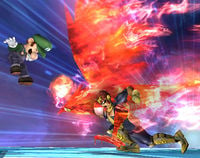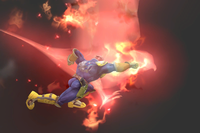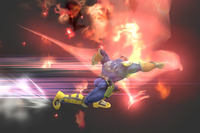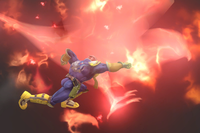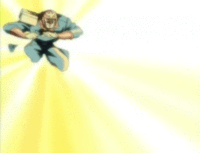Falcon Punch
| Falcon Punch | |
|---|---|
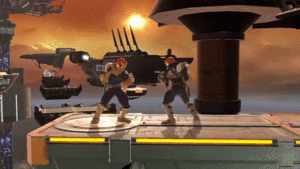 Captain Falcon using the move in Ultimate. | |
| User | Captain Falcon |
| Universe | F-Zero |
Falcon Punch (ファルコンパンチ, Falcon Punch) is Captain Falcon's neutral special move.
Overview[edit]
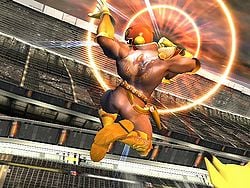
Falcon Punch consists of Captain Falcon performing his iconic move: a slow but powerful punch wreathed in falcon-shaped flames.
Throughout the Super Smash Bros. series, the Falcon Punch has consistently been one of the most powerful special attacks. However, its power is counterbalanced by its predictability, due to its slow start-up time, along with Captain Falcon loudly announcing "Falcon...PUNCH!" every time he uses it.
Aesthetically, the move will cause Captain Falcon to kneel downward, charge up power during the delay, before punching forward while crouching. In Smash 64, Captain Falcon will shake his fist above his head while charging (if in midair, he cowers away from his orientation instead). In Melee, Captain Falcon's stance is straightened, with his arms lowered and his left hand out (in midair, he will also do a recovering inward turn after the punch). In Brawl, Smash 4 and Ultimate, the animation is somewhat similar, but Captain Falcon punches his right fist into his left before charging, and his pose is slightly exaggerated as a result of animation improvements.

The charging is accompanied by visible shockwaves in Smash 64, and fiery effects surrounding Captain Falcon's fist in every other installment. Each future game also improves the visuals of the move, starting from a simple fire falcon sprite in Smash 64, to a full 3D model in Melee, and from Brawl onward, realistic effects that form an enormous fiery falcon.
In Smash 64 and Melee, Falcon Punch is stronger in the air, having higher base knockback (and shield damage in Smash 64) - although, from Brawl onwards, the aerial version is weaker, dealing less damage (and subsequently, less knockback) than the grounded version.
In Melee and Brawl, this move is one of the few attacks in the game that is more powerful than the Home-Run Bat at high damages, especially in the former game, due to his bat swing's upward trajectory. Thus, it is common for a Falcon Punch to be used in place of the Home-Run Bat for a finisher while attempting Home-Run Contest world records, especially since Captain Falcon's own unique forward smash attack with any battering weapon in Melee renders it impractical to use for this scenario.
From Super Smash Bros. Brawl onward, Captain Falcon can turn around during the start-up of the punch to perform a Reverse Falcon Punch. This slightly increases its already high damage and knockback, at the cost of slightly more start-up time. Uses of the reverse Falcon Punch includes mindgaming opponents, catching rolls, or simply making an offstage punish even more powerful. Although the move can be reversed in Melee like all neutral special moves, this does not change the damage or knockback dealt, nor does it make the move take longer to come out.
In Super Smash Bros.[edit]
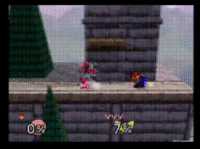
The Falcon Punch in Super Smash Bros. is the fastest version in the series, due to having much less start-up and ending lag than in the subsequent games. As a result of its speed, along with the game's lack of air dodging, high hitstun, and opponents only being able to affect it with SDI, it is easier to combo with than in every other game. Falcon Punch can also be used for recovery when Falcon is recovering from high up, as it gives additional horizontal distance as well as minor vertical distance when angled up.
It is also used as a combo finisher; Common tactics include forward throw to Falcon Punch (48-72% on fast-fallers using various jump heights) and up aerial to Falcon Punch if immediately inputted after a platform land. It can also be combod out of down air depending on %.
In Super Smash Bros. Melee[edit]
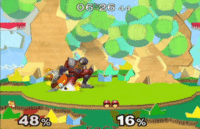
In Melee, the Falcon Punch was made much slower, which removes its use as a recovery and combo-finishing option. Due to Captain Falcon's down aerial being much slower than in Smash 64, along with the lowered effectiveness of L-canceling and the introduction of DI, the Tapion Combo was made more unreliable and very uncommon in competitive play, although other combos exist as a result of gameplay changes. The move has also seen a reduction to its knockback scaling, making it weaker despite its sweetspot dealing more damage.
The move is also much more unsafe against shielding opponents. In Smash 64, Falcon Punch caused immensely high shieldstun to the point where the move was frame positive on shield. In Melee, however, with shieldstun/shield damage being significantly reduced, the move causes much less shieldstun and has become highly punishable if it lands against a shielding opponent.
One of the most famous combos is the Sacred Combo, invented by Cort, which involves following up a Knee Smash into an aerial Falcon Punch. If performed successfully, this combo results in a KO in almost all cases, although by performing this combo, Captain Falcon may fail to recover back if he jumps too far off the edge. Additionally, the only reliable way to connect the two moves is if the opponent poorly DIs towards Captain Falcon. Regardless, KOing an opponent with the Sacred Combo is widely regarded as being one of the most stylish ways to do so. The Sacred Combo is also used to jokingly describe a common means of taking stocks at low to mid-level play, where fighters with powerful Back throws will attempt to roll behind a cornered opponent and grab them, making for a relatively easy position to KO with a back throw at the ledge.
The Tapion Combo, a down aerial to Falcon Punch combo named after a Smasher that landed it consistently, is also possible, though only works at specific percents.
The G-Regulate combo, named after G-regulate, is another combo that allows Captain Falcon to combo an L-canceled down aerial into a Falcon Punch except it is performed by doing a down aerial on top of a platform, works against some characters at specific percents. It can be avoided with DI.
In Super Smash Bros. Brawl[edit]
Besides the introduction of the "Reverse Falcon Punch", the Falcon Punch was nerfed (particularly the aerial version, which is now weaker than the grounded version). Falcon Punch has slightly lower knockback scaling, though this does not have a huge impact on the move since it can still KO as low as 55% from center-stage.
In Super Smash Bros. 4[edit]
While retaining its ability to be reversed, Falcon Punch was nerfed from Brawl, having significantly lower base knockback, slightly less knockback scaling, a smaller hitbox and more ending lag, causing it to be unsafe on hit at 0% and making it weaker than his fully-charged forward smash. However, the move now deals more consistent damage throughout: a standard grounded punch deals 25% damage through its duration, while a reversed punch deals 28%, with neither variant having any sourspots (although the maximum damage output of the standard punch was reduced by 2%).
Compared to Brawl, Falcon Punch sees a little bit more utility due to air dodges having landing lag like in Melee. It should also be noted that, when used in the air, the Falcon Punch deals 3% less damage, but if it is charged in the air and activates on the ground, this penalty does not apply.
In Super Smash Bros. Ultimate[edit]
Falcon Punch is significantly stronger than in Smash 4, now being able to KO at around 60%, and being the safest version on hit at 0%. The non-reversed version also has slightly lower ending lag. However, the punch doesn't move Captain Falcon forward as much as before, hindering its range. Like many slow and powerful attacks, Falcon Punch causes Special Zoom if it lands.
Kirby's Falcon Punch[edit]
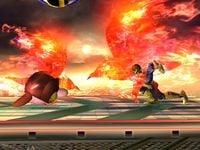
Kirby's Falcon Punch is notable, as with the exception of Smash 4, Kirby's Falcon Punch differs from Falcon's in every game.
In Smash 64, Kirby's Falcon Punch does not have a middle hit and its sweetspot is larger than Captain Falcon's. As a result, his 26% sweetspot is significantly easier to land compared to Falcon's. His aerial Falcon Punch, however, does not deal extra shield damage, unlike Falcon's.
In Melee, Kirby's Falcon Punch does not have a middle hit and its sweetspot and sourspot are positioned differently from Falcon's (with Falcon's sweetspot being closer to him while Kirby's is further away from him).
In Brawl, Kirby's Falcon Punch has smaller hitboxes than Falcon's; however, it retains its knockback values from Melee, making it stronger than Falcon's. If Kirby uses the Falcon Punch immediately after a jump, he will get a large boost upward. This is most noticeable with his footstool jump, which goes nearly twice as high as normal. This is sometimes known as a footstool punch. Captain Falcon also has this vertical boost, although it is much smaller due to his higher falling speed.
In Ultimate, Kirby's Falcon Punch deals 1.2x more damage than Falcon's (as with most of Kirby's copy abilities), albeit with its knockback being compensated as a result. In the air, however, it receives an additional knockback reduction, and does not get stronger when reversed.
Instructional quotes[edit]
| Release a fiery blow after a brief charge. | ||
| A splendid punch. Punch backward for more power. | ||
| Powers up for a moment then strikes with a flaming punch. Can change direction while charging. |
Customization[edit]
Special Move customization was added in Super Smash Bros. 4. These are the variations:
| 1. Falcon Punch | 2. Falcon Dash Punch | 3. Mighty Falcon Punch |
|---|---|---|
| "Charge up for a moment, then strike. The direction can be changed while charging." | "Dash forward and punch. Slightly weaker, and you're vulnerable just before striking." | "A bigger, more powerful Falcon Punch, but the buildup leaves you more open than ever." |
- Falcon Punch: Default Punch.
- Falcon Dash Punch: After startup, Falcon dashes forward, dealing less damage than default punch. Has slightly more startup but not as much as Mighty Falcon Punch.
- Mighty Falcon Punch: Has a bigger, longer-lasting hitbox, but even longer startup. Contrary to its name and description, its damage and knockback are actually weaker than the default punch, especially on the late hit.
Origin[edit]
The Falcon Punch originated in the Super Smash Bros. series and is generally considered both a part of the Super Smash Bros. universe and his falcon motif. The move made its F-Zero debut with a scene from the episode The Legend of Falcon in F-Zero: GP Legend, where it's used by Captain Falcon to prevent Black Shadow from escaping a reactor's explosion, defeating him. This version uses blue, electric effects rather than its trademark falcon-shaped flame. The explosion, large enough to be seen from outside the Milky Way Galaxy, is often misinterpreted as being caused by the Falcon Punch itself, consequently becoming memetic. Outside of Super Smash Bros., the move is often used to describe or add humor to powerful punch-based events as an imitation of its power in GP Legend and within the Super Smash Bros. games, often with voice clips or special effects inserted.
In Smash, the scene in GP Legend is seemingly referenced in a Subspace Emissary cutscene, where Captain Falcon performs a Falcon Punch on a giant R.O.B. in a similar fashion, while unwittingly killing a number of Olimar's Pikmin. In Smash, the move is referenced in Captain Falcon's Codec Conversation featuring Otacon, who coincidentally shares the same Japanese voice actor with Captain Falcon in GP Legend. Additionally, the crowd cheer for Captain Falcon consists of repeated chants of "Falcoooooon Punch!" in the English versions of Smash 4 and Ultimate.
The move would once again be referenced in F-Zero with F-Zero GX's ending song, specifically in the line "When myopic confusion threatens your lunch / Falcon will be unleashing a Falcon Punch."
Gallery[edit]
Pre-release image of Falcon Punch in Super Smash Bros. for Wii U.
A full view of the fiery falcon in Super Smash Bros. for Wii U.
In other languages[edit]
Trivia[edit]
- In Brawl, there is a glitch in which if a player uses a Reverse Falcon Punch on Pit and Pit pulls out the Mirror Shield at the correct moment, Captain Falcon will be sent backwards a long way, longer than many stages. An example can be seen here. The same can be done with Mario's Cape and Ganondorf's Warlock Punch.
- In Melee and Brawl, if a Falcon Punch is performed, the echoing sound of a falcon screeching can be heard.
- In Brawl, the falcon-shaped flames appear after the first hitbox, whereas in SSB64 and Melee they appear at the same time.
- Captain Falcon always uses his right fist to perform the Falcon Punch. However, he uses his left fist during his appearance in the reveal trailer "By Book, Blade, and Crest of Flame", while Kirby will use either hand depending on what direction he is facing (since he always faces the screen).
Technical details[edit]
- Captain Falcon (SSB)/Neutral special
- Captain Falcon (SSBM)/Neutral special
- Captain Falcon (SSBB)/Neutral special
- Captain Falcon (SSB4)/Neutral special
- Captain Falcon (SSBU)/Neutral special
